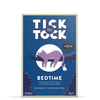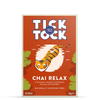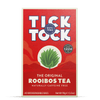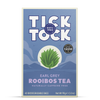The many health benefits of drinking tea are being discovered all the time. However, normal black and green teas contain caffeine, which some people prefer to avoid. For those looking to enjoy tea while reducing their caffeine intake, there are two options: decaffeinated tea and caffeine free tea. But what's the difference? Read on for the low-down.

What is caffeine?
Caffeine is a natural chemical found in certain plants, most notably in coffee, cacao and of course black, green and white teas. Whilst tolerable in small quantities, too high a caffeine intake can affect blood pressure and heart health, and can contribute to insomnia as well as anxiety, palpitations and tremors. Because, it is a natural compound, the amount of caffeine in each plant can vary enormously.
Coffee generally has the most milligrams of caffeine, but different types of tea, whether black or oolong, green or white, can contain varying levels of caffeine depending on where it was grown and how it was picked and processed. Some black teas might even have more caffeine than some weaker coffees. Green tea generally has less than black teas, but again there might be quite a lot of overlap at the upper end of the green tea caffeine scale. This means that if you're drinking tea it can be very difficult to gauge exactly how much caffeine you are consuming in a day.
Decafeinated Tea vs Caffeine Free Tea
If you are trying to cut down on caffeine in tea, the best way is to substitute regular tea with either decaf tea or naturally caffeine free. But what's the difference?
Decaf tea means that the black or green tea leaves have undergone a decaffeination process to remove the caffeine molecules. Conversely, ‘caffeine free’ means the plant never actually contained caffeine in the first place; it was simply not in it’s genetic make-up. This means that the leaves undergo little processing and will not contain any trace caffeine.

Are decaffeinated teas bad for you?
Decaffeinated teas still have health benefits associated with tea. The downside of decaffeination is that if you are sensitive to caffeine and its side effects, you will still be consuming some caffeine in a decaf cuppa. This is because it is virtually impossible to remove all the caffeine, so trace amounts will always remain after the decaffeinated process. However, the amount of caffeine in a decaffeinated black tea will be miniscule compared to a standard cup of black tea, so if you're simply looking to reduce your caffeine, it's a great option.
Try our NEW Decaf Black Tea for the unmistakeable taste of a traditional cuppa - minus the sleepless night!
Naturally caffeine free teas
Teas which are naturally caffeine free are a great choice if you're cutting out caffeine altogether.
Rooibos in particular is a great alternative to caffeinated black teas with its rich and smooth taste. You can drink it with or without milk and plant milks, make it as strong as you like and even leave the teabag in as it will not go bitter.
Rooibos, the 'Wonder plant'
With zero caffeine, low tannins and high antioxidants, including a polyphenol called Aspalathin which is only found in rooibos, there is increasing evidence of the wide-ranging benefits of this so-called wonder plant. Studies have shown rooibos can contribute to cardiovascular health, may stabilise glucose (so important for diabetics) as well as having a positive effect on cognitive and brain function, recovery after exercise, and even weight loss!


Tick Tock rooibos tea
At Tick Tock, we have a rooibos to suit all tastes, whether it’s our classic Earl Grey Rooibos scented with bergamot oil (naturally caffeine free of course), or our much-loved velvety Vanilla, a deliciously indulgent and guilt-free treat.
And have you tried our Tick Tock Green rooibos? Lighter and fresher than normal red rooibos thanks to the way it is prepared after harvesting, it makes for a great alternative to normal green tea (which contains caffeine) and is brimming with rooibos goodness. What’s not to love?!

Browse our naturally caffeine free tea range.
[Reviewed and updated February 2024]




